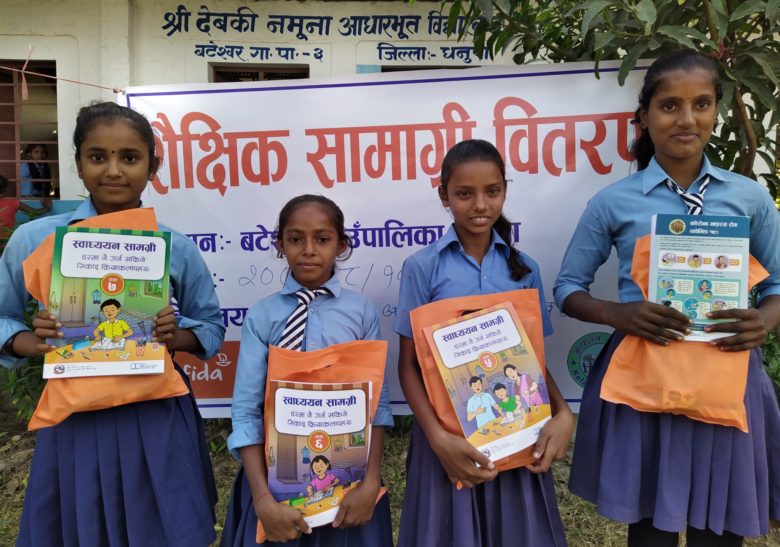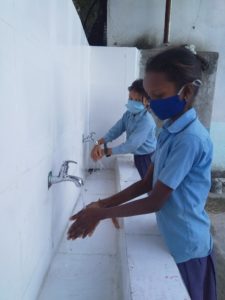How are the sponsored children in India and Nepal doing?

The corona situation in India and Nepal remains difficult. The pandemic has brought new challenges to Fida’s work with sponsored children, providing uncommon forms of support, such as food-aid. The core task to walk beside communities in the long-term remains.
2020 was an exceptional year for Fida’s sponsorship communities in India and Nepal. Unique arrangements have been used. At times, the children have been completely out of school. Distance learning has been supported by distributing learning materials to schoolchildren.
Changing situations require flexibility
The corona situation in India was improving until the pandemic erupted again in April. Raija Harri, coordinator of Fida’s deaconate program, says that the year has been tough for Fida’s long-term sponsorship in the Hyny orphanage and school in Machilipatnam. When the pandemic began, schools were closed. As the situation improved, the children gradually got back until the schools had to close again this spring. Andhra Pradesh state officials decided that children could move to the next class even though the year passed without learning much.
According to Harri, distance learning in Mumbai has also not succeeded in replacing the lost teaching in classrooms.
– People living in overpopulated slums are in a very vulnerable position in the pandemic situation. The plight of the families involved in our program has been exacerbated by the fact that the parents of many children have lost their livelihoods due to the pandemic, Harri says.
– Fida’s third sponsorship community in Udaipur, on the other hand, has survived the pandemic quite well, Harri estimates.
This has been helped by a local innovative team that has made the digital leap a success after a difficult start. The project staff has been in contact with parents via smartphones. There were fears that the children would forget what they had already learned, but the Fida-sponsored children’s clubs have produced learning materials so that the children have been able to study at home. In addition to sponsorship, over 500 other children attend 10 clubs in the Udaipur region.
None of the children from Hyny orphanage and school have contracted COVID-19, and there have been only a few cases among Fida’s sponsored children in Mumbai. On the other hand, some workers in Udaipur and Hyny have fallen ill, and in Hyny, some very seriously. The sponsorship activities have focused on health education and prevention, for example by distributing hand sanitizer and masks. In Udaipur, women were also taught to make their own fabric masks.
– It is very important to educate people about vaccinations because there are many biased preconceptions, Raija Harri explains on the diversity of challenges related to COVID-19.
The financial support of the sponsors is very important, but in addition Harri emphasizes the importance of prayer during adversity.
The financial support of the sponsors is important, as is prayer.
Nepal daily wage earners in real danger
In Nepal, corona infections erupted dramatically as the Indian Corona variant spread in the country. The disease mainly spread with Nepali migrant workers returning home from amid a new wave of pandemics in India. Fida’s sponsored children and their family members have also contracted the virus.
Fida works in Nepal for the benefit of the most vulnerable children and young people.
– We especially focus on their right to schooling, health, and a safe life, says Vesa Mättö, Fida’s Country Program Coordinator.
Fida works in the Himalayan mountains in the rural village of Khiji Demba and in the plains of southern Nepal in the municipality of Bateshwor, where a Maitil-speaking minority lives. In both areas, the situation has been difficult during the Corona period. People living on a daily wage live hand to mouth and cannot afford to build up food stocks. As the pandemic worsened, many families’ livelihood ceased.
– We have responded to the acute emergency by delivering food packages and hygiene products to the most vulnerable in cooperation with municipalities, Mättö says of the concrete support measures.
Like in India, the closure of schools in Nepal has been a serious challenge. Last year, the schools were closed for seven months and this spring, with the new Corona wave, the schools have been closed again.
– At the request of the Nepalese Ministry of Education, Fida has partnered with its local partners in supporting distance learning by distributing study materials to 27,746 children and young people, Mättö says.
The next distance learning school package is already being prepared, as schools are still likely to stay closed for many months. The goal is for every child in the Fida work area to be able to continue their education.
Parents of many children have lost their jobs due to the pandemic.
– In Nepal, almost half of the children drop out of primary school and the closure of schools due to the Corona will probably further increase the number of school dropouts, Mättö estimates.
There is also a risk that families will need children to earn a living, with the result that many children will have to do heavy labour. However, Mättö emphasizes that because of Fida’s long-term work, the situation has improved considerably, and almost all children now start school. The main goal now is that they stay in school to the end. In Fida’s sponsorship communities, awareness of the importance of education has increased, so hopefully studies will continue with the support of distance learning materials, and children will return to school as the situation allows.

Washing places and toilets have been built in schools
Together with its partners, Fida has invested in health education in schools and through social media and radio. Mättö says that while the schools were closed, work has been done to improve the sanitary facilities of the schools so that the pupils can take care of their hygiene when they return to the school.
School closures due to corona will increase the number of school dropouts.
– Awareness alone is not enough, the infrastructure must also be in place. In addition to talk about hand washing, schools must provide facilities for handwashing, Mättö emphasizes.
– The crisis resilience of local communities is strengthened through good partnerships when local actors are involved, Mättö sums up Fida’s operating principles.
Communities have realized their role and are committed to children’s well-being and schooling. The protracted pandemic is challenging development. There is still a need for new sponsors.
